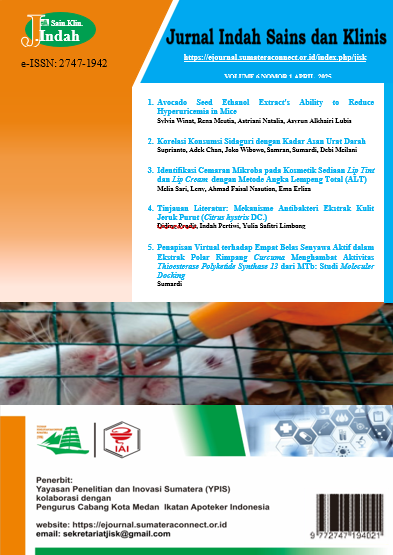Avocado Seed Ethanol Extract's Ability to Reduce Hyperuricemia in Mice
DOI:
https://doi.org/10.52622/jisk.v6i1.01Kata Kunci:
hyperuricemia, avocado seed, miceAbstrak
Background: Hyperuricemia causes uric acid buildup in the blood, often in older people due to how the body processes purines. Studies show avocado seeds (Persea americana Mill.) may reduce blood uric acid through their flavonoid content, which fights off oxygen molecules and reduces inflammation, stopping a process called xanthine oxidation. Objective: This study aims to assess the effectiveness of avocado seed extract in lowering uric acid levels in male mice. Method: Mice were induced with potassium bromate, and the mice were divided into six groups of five individuals each. The groups included a negative control (Na CMC 0.5%), a positive control (allopurinol 10 mg/kg BW), treatment 1 (avocado seed extract 120 mg/kg BW), treatment 2 (avocado seed extract 150 mg/kg BW), treatment 3 (avocado seed extract 180 mg/kg BW), and a normal group (not treated). Checked uric acid levels for seven days. Then, used a statistical test and a BNT test with the LSD method to examine the results. Results: The findings showed that avocado seed extract given at a dose of 120-180 mg/kg body weight can reduce uric acid levels in mice. Conclusion: The best dose, 150 mg/kg BW, reduced hyperuricemia levels by 37.3%, with a significance value of 0.118
Unduhan
Referensi
Norsanah. “Gambaran Kadar Asam Urat pada Mahasiswa Diploma III Keperawatan Stikes Dirgahayu Samarinda Tahun 2020”. Jurnal Keperawatan Dirgahayu. 2021; 3(2). DOI: https://doi.org/10.52841/jkd.v3i2.193
Latief, M., Tarigan, I. L., Sari, P. M., & Aurora, F. E. “Aktivitas Antihiperurisemia Ekstrak Etanol Daun Sungkai (Peronema canescens Jack) pada Mencit Putih Jantan”. Jurnal Farmasi Indonesia. 2021; 18 (1). DOI: https://doi.org/10.23917/pharmacon.v18i01.12880
Farmakope Herbal Indonesia Edisi kedua. 2017. Departemen Kesehatan Republik Indonesia.
Skoczynska, M., Chowaniec, M., Szymczak, A., Langner-Hetmanczuk, A., Maciazek-Chyra, B., & Wiland, P. “Pathophysiology of Hyperuricemia and Its Clinical Significance – A Narrative Review”. Reumatologia. 2020; 58(5): 312-323. DOI: https://doi.org/10.5114/reum.2020.100140
Alatas, H. “Penatalaksanaan Hiperurisemia pada Penyakit Ginjal Kronik (CKD)”. Herb-Medicine Journal. 2021; 4(1): 3-16. DOI: https://doi.org/10.30595/hmj.v4i1.5805
Feliana, K., Sri, M., & Harjono. “Isolasi dan Elusidasi Senyawa Flavonoid dari Biji Alpukat (Persea americana Mill.)”. Indonesian Journal of Chemical Science. 2018; 7(2): 154. DOI: https://doi.org/10.15294/ijcs.v7i2.20997
Tayeb, R., Mience, U., & Usmar. Uji Efek Pemberian Ekstrak Etanol Daun Sirsak (Anonna muricata L.) terhadap Kadar Asam Urat pada Mencit Putih (Rattus norvegicus). Prosiding Seminar Nasional Tumbuhan Obat Indonesia Ke-50. Samarinda. 2016; 367-373. DOI: https://doi.org/10.25026/mpc.v3i2.135
Mayangsari, S. N., “Uji Efek Antihiperurisemia Daun Alpukat (Persea americana Mill) Terhadap Mencit Jantan (Mus Musculus),” Karya Tulis Ilmiah, 2023.
Nastiti, H. M., “Uji Aktivitas Infusa Daun Alpukat (Persea Americana Mill) Sebagai Penurun Kadar Asam Urat pada Mencit Putih Jantan Galur Wistar,” Skripsi. Universitas Bakti Tunas Husada Tasikmalaya; 2020.
Lidi, I. M., Milka, M. M., Fransiska, T. K., & Karina, L. “Penambahan Tepung Biji Alpukat sebagai Sumber Antioksidan pada Makanan Sereal”. Journal of Human Health. 2021; 1(1): 9–14. DOI: https://doi.org/10.24246/johh.vol1.no12021.pp9-14
Ramadani, A. “Efektivitas Teh Herbal Daun Salam (Syzygium Polyanthum Wight) terhadap Penurunan Kadar Asam Urat pada Mencit (Mus Musculus)”. Jurnal Kesehatan Yamasi Makassar. 2018; 2(1).
Anggraini, D. “Aspek Klinis Hiperurisemia”. Scientific Journal. 2022; 1(4): 301-307. DOI: https://doi.org/10.56260/sciena.v1i4.59
Yusuf, M., Muhamad R. Al-Gizar, Yahdiel Y. A., Rorrong, Badaring, D. R., Aswanti, H., MZ, S. M. A., Dzalsabila, A., Ahyar, M., Wulan, W., Putri, M. J. & Arisma, W. F., “Teknik Manajemen dan Pengelolaan Hewan Percobaan (Memahami Perawatan dan Kesejahteraan Hewan Percobaan)”. Makassar: Jurusan Biologi FMIPA UNM. 2022: 10-12.
Subagja, Bambang K., & Seftiviani M. “Efektivitas Antihiperurisemia Suspensi Ekstrak Akar Seledri (Apium graveolens L.) terhadap Mencit Putih Jantan (Rattus norvegicus) yang Diinduksi Kalium Bromat”. Jurnal Farmasi dan Sains. 2021; 4(2): 12-23.
Fitrya, & Muharni. “Efek Hipourisemia Ekstrak Etanol Akar Tumbuhan Tunjuk Langit (Helminthostachys zaylanica Linn Hook) terhadap Mencit Jantan Galur Swiss”. Traditional Medicine Journal, 2014; 19(1), 14–18.
Suhendra, A.T., Awaloei, H. & Wuisan, J. “Uji Efek Ekstrak Biji Alpukat (Persea americana Mill.) terhadap Kadar Kolesterol Total pada Mencit Wistar (Rattus norvegicus)”. Jurnal e-Biomedik (eBm). 2016; 4(1). DOI: https://doi.org/10.35790/ebm.4.1.2016.11376
Nurkhasanah, Bachri, M. S., & Yuliani, S. “Antioksidan dan Stres Oksidatif”. Yogyakarta: UAD Press. ISBN: 978-623-5635-85-9. 2023.
Ambarwati, R., & Erni, R. “Formulasi dan Evaluasi Nanopartikel Ekstrak Biji Alpukat (Persea americana Mill) dengan Polimer Plga”. Majalah Farmasetika, 2022; 7(4): 305-313. DOI: https://doi.org/10.24198/mfarmasetika.v7i4.38549
Unduhan
Diterbitkan
Terbitan
Bagian
Lisensi
Hak Cipta (c) 2025 Jurnal Indah Sains dan Klinis

Artikel ini berlisensiCreative Commons Attribution-NonCommercial-ShareAlike 4.0 International License.
Copyright © The Author(s). This article is licensed under a Creative Commons Attribution-NonCommercial-ShareAlike 4.0 International License (CC BY-NC-SA 4.0).








